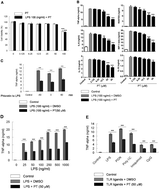Immunomodulation of phloretin by impairing dendritic cell activation and function
Abstract
Dietary compounds in fruits and vegetables have been shown to exert many biological activities. In addition to antioxidant effects, a number of flavonoids are able to modulate inflammatory responses. Here, we demonstrated that phloretin (PT), a natural dihydrochalcone found in many fruits, suppressed the activation and function of mouse dendritic cells (DCs). Phloretin disturbed the multiple intracellular signaling pathways in DCs induced by the Toll-like receptor 4 (TLR4) agonist lipopolysaccharide (LPS), including ROS, MAPKs (ERK, JNK, p38 MAPK), and NF-κB, and thereby reducing the production of inflammatory cytokines and chemokines. Phloretin also effectively suppressed the activation of DCs treated with different dosages of LPS or various TLR agonists. The LPS-induced DC maturation was attenuated by phloretin because the expression levels of the MHC class II and the co-stimulatory molecules were down-regulated, which then inhibited the LPS-stimulating DCs and the subsequent naïve T cell activation in a mixed lymphocyte reaction. Moreover, in vivo administration of phloretin suppressed the phenotypic maturation of the LPS-challenged splenic DCs and decreased the IFN-γ production from the activated CD4 T cells. Thus, we suggest that phloretin may potentially be an immunomodulator by impairing the activation and function of DCs and phloretin-contained fruits may be helpful in the improvement of inflammation and autoimmune diseases.


 Please wait while we load your content...
Please wait while we load your content...